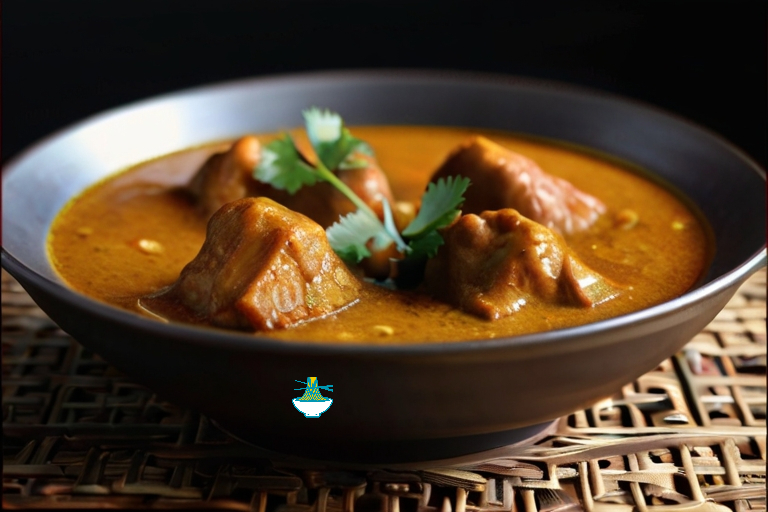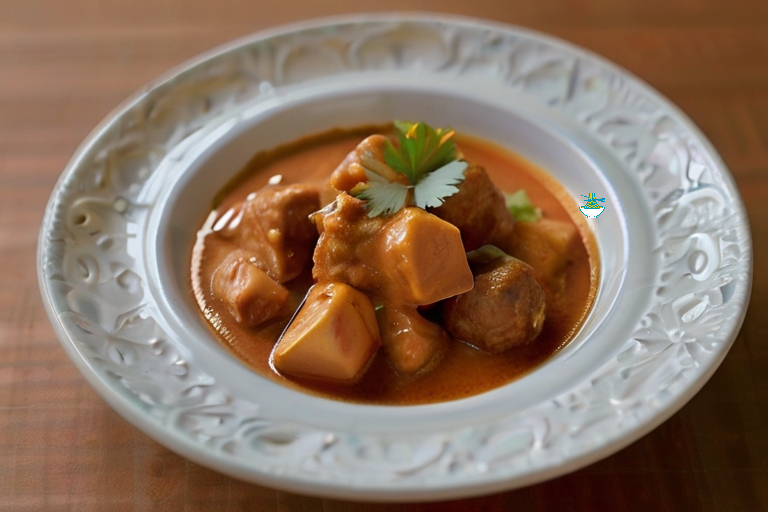Embark on a culinary journey where the flavors of democracy and diversity collide in a harmonious symphony of curry from various cultural backgrounds. "Global Harmony: Democratic Curry Fusion" brings together the vibrant spices and aromatic herbs of Indian, Thai, and Japanese cuisines, creating a tantalizing culinary experience that transcends borders.
Indulge in the rich and complex flavors of Indian curry, where the marriage of spices such as cumin, coriander, and turmeric dance on your palate, complemented by creamy coconut milk and savory meats or vegetables. Experience the fiery heat of Thai curry, with its bold blend of chili peppers, lemongrass, and galangal, balanced by the sweetness of palm sugar and the tang of lime leaves.
Savor the delicate nuances of Japanese curry, a milder yet equally captivating rendition, featuring a roux base infused with the umami richness of dashi, soy sauce, and mirin, paired with tender chunks of meat and hearty root vegetables.
Each dish in this democratic curry fusion is a celebration of cultural diversity, inviting you to explore the unique flavors and culinary traditions of different regions, united on a single plate. Whether you're a spice aficionado or a lover of subtle flavors, "Global Harmony: Democratic Curry Fusion" promises a gastronomic adventure that transcends boundaries and brings people together through the universal language of food.
Ingredients:
- 1 tablespoon vegetable oil
- 1 onion, finely chopped
- 3 cloves garlic, minced
- 1 tablespoon ginger, minced
- 2 tablespoons curry paste (a mix of Indian, Thai, and Japanese curry paste)
- 1 can (14 ounces) coconut milk
- 1 cup chicken broth or vegetable broth
- 1 pound chicken breast, cut into bite-sized pieces (or tofu for vegetarian option)
- 1 cup mixed vegetables (such as bell peppers, carrots, potatoes, and peas)
- 2 tablespoons soy sauce
- 1 tablespoon fish sauce (optional)
- 1 tablespoon brown sugar
- Salt and pepper, to taste
- Cooked rice, for serving
- Fresh cilantro, for garnish
- Lime wedges, for serving

Instructions:
1- Heat the vegetable oil in a large skillet or wok over medium heat. Add the chopped onion and cook until softened, about 3-4 minutes.
2- Add the minced garlic and ginger to the skillet and cook for another 1-2 minutes, until fragrant.
3- Stir in the curry paste and cook for 1 minute, allowing the flavors to bloom.
4- Pour in the coconut milk and chicken broth, stirring to combine. Bring the mixture to a simmer.
5- Add the chicken pieces (or tofu) to the skillet and cook until they are cooked through, about 5-7 minutes.
6- Once the chicken is cooked, add the mixed vegetables to the skillet. Simmer for an additional 5 minutes, or until the vegetables are tender.
7- Stir in the soy sauce, fish sauce (if using), and brown sugar. Season with salt and pepper to taste.
8- Serve the democratic curry over cooked rice, garnished with fresh cilantro and lime wedges.
9- Enjoy the fusion of Indian, Thai, and Japanese flavors in this delightful democratic curry!
Note: Feel free to adjust the level of spiciness by adding more or less curry paste according to your preference. You can also customize the vegetables and protein based on what you have on hand or your personal taste preferences.
Nutritional Values:
Here's an approximate nutritional breakdown for the main ingredients in the Global Fusion Curry recipe:
Vegetable Oil (1 tablespoon):
- Calories: 120
- Fat: 14g
- Saturated Fat: 1g
- Trans Fat: 0g
- Cholesterol: 0mg
- Sodium: 0mg
- Carbohydrates: 0g
- Fiber: 0g
- Sugars: 0g
- Protein: 0g
benefits:Vegetable oil provides essential fatty acids and fat-soluble vitamins, and it serves as a source of energy for the body.
Onion (1 medium):
- Calories: 44
- Fat: 0.1g
- Sodium: 2mg
- Carbohydrates: 10g
- Fiber: 1.9g
- Sugars: 4.7g
- Protein: 1.2g
benefits:Onions are rich in antioxidants, vitamins, and minerals. They may help boost immunity, regulate blood sugar levels, and support heart health.
Garlic (3 cloves):
- Calories: 13
- Fat: 0.1g
- Sodium: 1mg
- Carbohydrates: 3g
- Fiber: 0.2g
- Sugars: 0.1g
- Protein: 0.6g
benefits:Garlic is known for its antibacterial and antiviral properties. It may help lower cholesterol levels, regulate blood pressure, and boost immune function.
Ginger (1 tablespoon, minced):
- Calories: 5
- Fat: 0.1g
- Sodium: 1mg
- Carbohydrates: 1g
- Fiber: 0.1g
- Sugars: 0.1g
- Protein: 0.1g
benefits:Ginger has anti-inflammatory and digestive properties. It can help alleviate nausea, improve digestion, and reduce muscle pain.
Curry Paste (2 tablespoons):
- Nutritional values vary widely depending on the brand and type of curry paste used. Please refer to the nutrition label on the product for accurate information.
benefits:Curry paste typically contains a blend of spices and herbs, offering various health benefits such as antioxidant properties, anti-inflammatory effects, and digestive support, depending on the ingredients used.
Coconut Milk (1 can, 14 ounces):
- Calories: 420
- Fat: 45g
- Saturated Fat: 40g
- Trans Fat: 0g
- Cholesterol: 0mg
- Sodium: 42mg
- Carbohydrates: 6g
- Fiber: 2g
- Sugars: 4g
- Protein: 4g
benefits:Coconut milk is rich in healthy fats called medium-chain triglycerides (MCTs), which may support weight loss and heart health. It also provides electrolytes and minerals like potassium and magnesium.
Chicken Breast (1 pound):
- Calories: 920
- Fat: 19g
- Saturated Fat: 5g
- Cholesterol: 375mg
- Sodium: 335mg
- Carbohydrates: 0g
- Fiber: 0g
- Sugars: 0g
- Protein: 165g
benefits:Chicken breast is a lean source of protein, essential for muscle repair and growth. It also contains vitamins and minerals such as niacin, vitamin B6, phosphorus, and selenium.
Mixed Vegetables (1 cup):
- Nutritional values will vary depending on the specific vegetables used. Here's an approximate average:
- Calories: 50-100
- Fat: 0-1g
- Sodium: 0-10mg
- Carbohydrates: 10-20g
- Fiber: 2-5g
- Sugars: 3-7g
- Protein: 1-3g
benefits:Mixed vegetables provide a wide array of vitamins, minerals, and antioxidants necessary for overall health. They support digestion, boost immunity, and may help reduce the risk of chronic diseases when consumed regularly.
These values are approximate and can vary based on factors such as brands, cooking methods, and specific ingredients used.


Comments